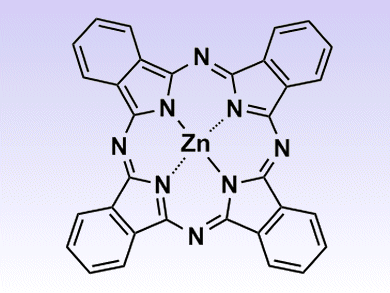Cancer cells use numerous mechanisms to escape from the detection of the immune system. Thus, helping the immune system to recognize and kill tumor cells is an emerging strategy to fight cancer.
According to Sean Marrache and colleagues, University of Georgia, USA, this aim can be achieved using nanoparticles. The researchers produced poly(lactide-co-glycolide)-b-polyethylenglycol nanoparticles and used them to deliver zinc phthalocyanine (pictured) into cancer cells. This compound is a photosensitizer and, after exposure to light, it generates reactive oxygen species that kill tumor cells. When killed through this mechanism, cancer cells release molecules that, in vitro, stimulated and activated immune cells to recognize and attack the tumor.
This novel approach could be used to develop new anti-cancer vaccines.
- Ex Vivo Programming of Dendritic Cells by Mitochondria-Targeted Nanoparticles to Produce Interferon-Gamma for Cancer Immunotherapy,
Sean Marrache, Smanla Tundup, Donald A. Harn, Shanta Dhar,
ACS Nano 2013.
DOI: 10.1021/nn403158n



